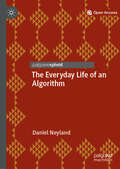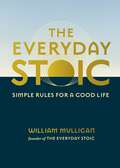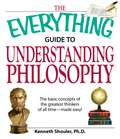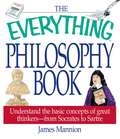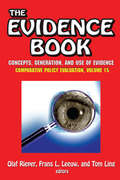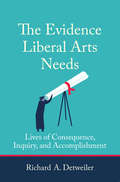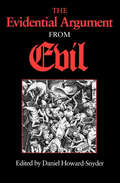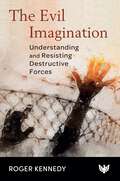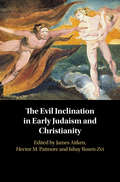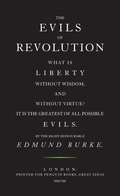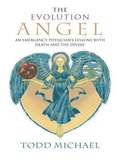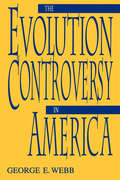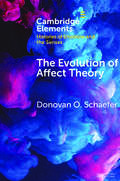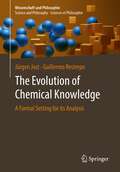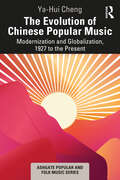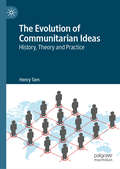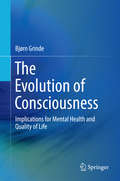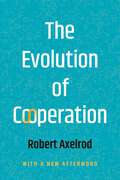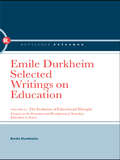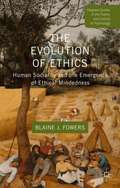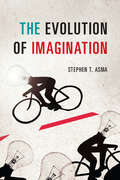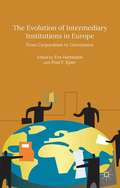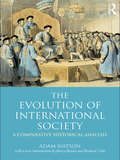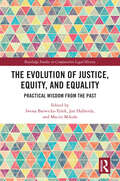- Table View
- List View
The Everyday Life of an Algorithm
by Daniel NeylandThis open access book begins with an algorithm–a set of IF…THEN rules used in the development of a new, ethical, video surveillance architecture for transport hubs. Readers are invited to follow the algorithm over three years, charting its everyday life. Questions of ethics, transparency, accountability and market value must be grasped by the algorithm in a series of ever more demanding forms of experimentation. Here the algorithm must prove its ability to get a grip on everyday life if it is to become an ordinary feature of the settings where it is being put to work. Through investigating the everyday life of the algorithm, the book opens a conversation with existing social science research that tends to focus on the power and opacity of algorithms. In this book we have unique access to the algorithm’s design, development and testing, but can also bear witness to its fragility and dependency on others.
The Everyday Stoic: Simple Rules for a Good Life
by William MulliganNavigate the obstacles of contemporary life and find happiness by following in the footsteps of the classical tradition of Stoicism in this empowering and accessible book written by the founder of the popular The Everyday Stoic account. William Mulligan, founder of The Everyday Stoic, transforms principles from ancient Stoic philosophy into a contemporary guide for overcoming the challenges of modern life and cultivating an unshakeable sense of inner calm, so that you too can live like a Stoic. Rediscover ancient wisdom and join the Stoic movement: From Marcus Aurelius to Seneca, the Stoics have a long and rich history. The Everyday Stoic draws on these timeless teachings and offers a chance to be part of a growing stoic community. Inside you'll discover how to: Cultivate Resilience: With practical tips and actionable advice, this is the perfect guide for anyone looking to gain resilience and overcome adversity, no matter what modern life throws their way. Follow Simple Rules for a Good Life: Explore key concepts such as confronting life's unpredictability and how thoughts create reality, which will empower you to not only be comfortable in the face of adversity but also to thrive. Boost Your Mental Health: Taking the lessons of Stoic Philosophy and applying them to your life can have positive effects on mental health, teaching you how to transform your mindset and shift how you perceive life's obstacles. Channel Ancient Greek and Ancient Roman thoughts and teachings in this accessible, life-transforming guide to making a better, calmer, and less stressed life.
The Everything Guide to Understanding Philosophy (The Everything®)
by Kenneth ShoulerComplex ideas explained in everyday language!Is there life after death? Are euthanasia, suicide, or stem cell research ethical acts? Does the use of performance enhancers in sports constitute cheating?These are the types of philosophical questions people face today. Philosophy is not a dead set of doctrines--it's a living body of knowledge that you can use to guide behavior and problem solving. In a lively, easy-to-follow approach, The Everything Guide to Understanding Philosophy introduces you to the major thinkers and the problems they've pondered over the last 2,600 years.In plain English, author Kenneth Shouler, Ph.D. explains all of the great philosophies--and provides contemporary examples to put them in perspective. He delves into the minds of such philosophers as:Socrates, Plato, and AristotleAugustine and AquinasSpinoza and DescartesLocke and HumeMill and NietzscheRussell and SartreIf you're ready to broaden your outlook on life, this is the book for you. Endlessly fascinating--and always clear and concise--it's the perfect introduction for budding philosophers!
The Everything Philosophy Book: Understand the Basic Concepts of Great Thinkers—from Socrates to Satre (Everything® Series)
by James MannionAt last, you can grasp the most difficult concepts of thought!If you&’ve always wanted to learn about philosophy but were too intimidated to get past the first word ending in &“ism,&” The Everything Philosophy Book provides simple explanations guaranteed to make philosophic ideas and concepts easy to understand. This entertaining book offers a broad overview of many diverse schools of thought—from antiquity up through the present day. In plain English, author James Mannion explains all of the great philosophies—and even provides contemporary examples to put them in perspective. Interspersed are fascinating sidebars that offer helpful hints toward understanding complex concepts and little-known facts about the lives of great philosophers. The Everything Philosophy Book delves into the minds of such philosophers as: -Socrates, Plato, and Aristotle -Augustine and Aquinas -Buddha and Confucius -Spinoza and Descartes -Locke and Hume -Voltaire and Rousseau -Mill and Nietzsche -Russell and Sartre Endlessly fascinating—and always clear and concise—The Everything Philosophy Book will be welcomed by anyone who wants to broaden his or her outlook on life.
The Everything Zen (The Everything®)
by Jacky SachDo you find yourself restless and distracted by the hustle and bustle of the modern world? Have you sought comfort in possessions and acclaim only to be disappointed by their emptiness? If so, you are not along. The Everything Zen Book introduces you to thousands of years of ancient teachings that can help you achieve inner peace and unity with the world around you. Whether you are at home or in the office, this easy-to-follow guide shows you how to apply ancient Zen principles to every area of your life—from relationships and your career to artistic expression and your health.
The Evidence Book (Comparative Policy Evaluation Ser.)
by Frans L. LeeuwFirst Published in 2017. Routledge is an imprint of Taylor & Francis, an Informa company.
The Evidence Liberal Arts Needs: Lives of Consequence, Inquiry, and Accomplishment
by Richard A. DetweilerEmpirical evidence for the value of a liberal arts education: how and why it has a lasting impact on success, leadership, altruism, learning, and fulfillment.In ongoing debates over the value of a college education, the role of the liberal arts in higher education has been blamed by some for making college expensive, impractical, and even worthless. Defenders argue that liberal arts education makes society innovative, creative, and civic-minded. But these qualities are hard to quantify, and many critics of higher education call for courses of study to be strictly job-specific. In this groundbreaking book, Richard Detweiler, drawing on interviews with more than 1,000 college graduates aged 25 to 65, offers empirical evidence for the value of a liberal arts education. Detweiler finds that a liberal arts education has a lasting impact on success, leadership, altruism, learning, and fulfillment over a lifetime. Unlike other defenders of a liberal arts education, Detweiler doesn&’t rely on philosophical arguments or anecdotes but on data. He developed a series of interview questions related to the content attributes of liberal arts (for example, course assignments and majors), the context attributes (out-of-class interaction with faculty and students, teaching methods, campus life), and the purpose attributes (adult life outcomes). Interview responses show that although both the content of study and the educational context are associated with significant life outcomes, the content of study has less relationship to positive adult life outcomes than the educational context. The implications of this research, Detweiler points out, range from the advantages of broadening areas of study to factors that could influence students&’ decisions to attend certain colleges.
The Evidential Argument from Evil (Indiana Series in the Philosophy of Religion)
by William L. Rowe Eleonore Stump Alvin Plantinga William P. Alston Richard M. Gale Paul Draper Peter van Inwagen Richard Swinburne Bruce Russell Stephen J. WykstraIs evil evidence against the existence of God? A collection of essays by philosophers, theologians, and other scholars. Even if God and evil are compatible, it remains hotly contested whether evil renders belief in God unreasonable. The Evidential Argument from Evil presents five classic statements on this issue by eminent philosophers and theologians, and places them in dialogue with eleven original essays reflecting new thinking by these and other scholars. The volume focuses on two versions of the argument. The first affirms that there is no reason for God to permit either certain specific horrors or the variety and profusion of undeserved suffering. The second asserts that pleasure and pain, given their biological role, are better explained by hypotheses other than theism. Contributors include William P. Alston, Paul Draper, Richard M. Gale, Daniel Howard-Snyder, Alvin Plantinga, William L. Rowe, Bruce Russell, Eleonore Stump, Richard G. Swinburne, Peter van Inwagen, and Stephen John Wykstra.
The Evil Imagination: Understanding and Resisting Destructive Forces
by Roger KennedyRoger Kennedy has written a masterful investigation into the concept of evil. He begins with a general view of the subject before moving into more detailed analysis. First is a review of the science of evil, including evidence from neuroscience and social psychology. This is followed by psychoanalytical studies of the individual and groups before presenting an overview of the philosophy of evil. Also included are historical and social studies which inform an understanding of evil in action. Kennedy goes on to examine the nature of genocide using a main focus on the Holocaust and of slavery. Both of these "journeys to evil" remain relevant for understanding contemporary society and issues. The Nazi past continues to disturb and resonate decades on. The politics and social fabric of Western society was reliant on slavery as a foundation of economic wealth and is haunted by its inability to process the harsh reality of slavery and its continuing after-effects. Kennedy moves from there to a discussion on the genius of Shakespeare and his encapsulation of the essential features of how evil can develop and take over a person's inner world. The book concludes with a summary of the main themes and a look at those who have resisted evil and what we can learn from them if we are to build a society that can resist the forces of evil. The book is informed by a psychoanalytic approach, with its emphasis on the power and influence of unconscious processes underlying human actions, and on the role of inner conflicting and elemental fears and anxieties often driving individual and group behaviours. It brings fresh insight to an eternal discourse.
The Evil Inclination in Early Judaism and Christianity
by Ishay Rosen-ZviOne of the central concepts in rabbinic Judaism is the notion of the Evil Inclination, which appears to be related to similar concepts in ancient Christianity and the wider late antique world. The precise origins and understanding of the idea, however, are unknown. This volume traces the development of this concept historically in Judaism and assesses its impact on emerging Christian thought concerning the origins of sin. The chapters, which cover a wide range of sources including the Bible, the Ancient Versions, Qumran, Pseudepigrapha and Apocrypha, the Targums, and rabbinic and patristic literature, advance our understanding of the intellectual exchange between Jews and Christians in classical Antiquity, as well as the intercultural exchange between these communities and the societies in which they were situated.
The Evils of Revolution
by Edmund BurkeWritten at a time when most of Europe supported the French Revolution, Edmund Burke’s prescient and, at the time, controversial denunciation of its mob rule predicted the Terror, began the modern conservative tradition and still serves as a warning to those who seek to reshape societies through violence. Throughout history, some books have changed the world. They have transformed the way we see ourselves – and each other. They have inspired debate, dissent, war and revolution. They have enlightened, outraged, provoked and comforted. They have enriched lives – and destroyed them. Now Penguin brings you the works of the great thinkers, pioneers, radicals and visionaries whose ideas shook civilization and helped make us who we are.
The Evolution Angel
by Todd MichaelR. Todd Michael was medical director of a level-three trauma center when he had his own brush with death before being saved by the voice of an angel. In this collection of true stories from the emergency room, Dr. Michael relates his experiences with dying patients and the angels that invariably attend these critical rites of passage. Eventually he began communicating with an angel who was sent to aid us in our human evolution. Evolution, as described in The Evolution Angel, is "a quantum leap, a jump to a completely new and higher level of being. " What exactly is that higher level of being, and how do we achieve it? The "Evolution Angel" provides fascinating lessons, wisdom, and insight into turning our human journey into one where we can not only communicate with the Spirit World, but we can access this otherworldly wisdom in our lives at any moment. Answering questions about the purpose of our lives, life after death, and the nature of our soul, this astounding book has already changed countless lives of those who have heard this in-demand speaker, or read his self-published edition that has sold thousands. Inspirational, poignant, and wise, The Evolution Angel is a guide for everyone who wants to learn about living at the highest level, and is curious about what happens to the soul after we die.
The Evolution Controversy in America
by George E. WebbA comprehensive intellectual history of America’s century-old debate over teaching evolution in public schools.For well over a century, the United States has witnessed a prolonged debate over the teaching of organic evolution in the nation’s public schools. The controversy that began with the publication of Darwin’s Origin of the Species had by the 1920s expanded to include theologians, politicians, and educators. The Scopes trial of 1925 provided the growing antievolution movement with significant publicity and led to a decline in the teaching of evolution.In The Evolution Crisis in America, George E. Webb details how efforts to improve science education in the wake of Sputnik resurrected antievolution sentiment and led to the emergence of “creation science” as the most recent expression of that sentiment. Creationists continue to demand “balanced treatment” of theories of creation and evolution in public schools, even though their efforts have been declared unconstitutional in a series of federal court cases. Their battles have been much more successful at the grassroots level, garnering support from local politicians and educators. Webb attributes the success of creationists primarily to the lack of scientific literacy among the American public.
The Evolution of Affect Theory: The Humanities, the Sciences, and the Study of Power (Elements in Histories of Emotions and the Senses)
by Donovan O. SchaeferAcross the humanities, a set of interrelated concepts - excess, becoming, the event - have gained purchase as analytical tools for thinking about power. Some versions of affect theory rely on Gilles Deleuze's concept of 'becoming', proposing that affect is best understood as a field of dynamic novelty. Reconsidering affect theory's relationship with life sciences, Schaefer argues that this procedure fails as a register of the analytics of power. By way of a case study, this work concludes with a return to the work of Saba Mahmood, in particular her 2005 study of the women's mosque movement in Cairo, Politics of Piety.
The Evolution of Chemical Knowledge: A Formal Setting for its Analysis (Wissenschaft und Philosophie – Science and Philosophy – Sciences et Philosophie)
by Jürgen Jost Guillermo RestrepoChemistry shapes and creates the disposition of the world's resources and provides novel substances for the welfare and hazard of our civilisation at an exponential rate. Can we model the evolution of chemical knowledge? This book not only provides a positive answer to the question, it provides the formal models and available data to model chemical knowledge as a complex dynamical system based on the mutual interaction of the social, semiotic and material systems of chemistry. These systems, which have evolved over the history, include the scientists and institutions supporting chemical knowledge (social system); theories, concepts and forms of communication (semiotic system) and the substances, reactions and technologies (material system) central for the chemical practice. These three systems, which have traditionally been mostly studied in isolation, are brought together in this book in a grand historical narrative, on the basis of comprehensive data sets and supplemented by appropriate tools for their formal analysis. We thereby develop a comprehensive picture of the evolution of chemistry, needed for better understanding the past, present and future of chemistry as a discipline. The interdisciplinary character of this book and its non-technical language make it an ideal complement to more traditional material in undergraduate and graduate courses in chemistry, history of science and digital humanities.
The Evolution of Chinese Popular Music: Modernization and Globalization, 1927 to the Present (Ashgate Popular and Folk Music Series)
by Ya-Hui ChengYa-Hui Cheng examines the emergence of popular music genres – jazz, rock, and hip-hop – in Chinese society, covering the social underpinnings that shaped the development of popular music in China and Taiwan, from imperialism to westernization and from modernization to globalization. The political sensitivities across the strait have long eclipsed the discussion of these shared sonic intimacies. It was not until the rise of the digital age, when entertainment programs from China and Taiwan reached social media on a global scale, that audiences realized the existence of this sonic reciprocation. Analyzing Chinese pentatonicism and popular songs published from 1927 to the present, this book discusses structural elements in Chinese popular music to show how they aligned closely with Chinese folk traditions. While the influences from Western genres are inevitable under the phenomenon of globalization, Chinese songwriters utilized these Western inspirations to modernize their musical traditions. It is a sensitivity for exhibiting cultural identities that enabled popular music to present a unique Chinese global image while transcending political discord and unifying mass cultures across the strait.
The Evolution of Communitarian Ideas: History, Theory and Practice
by Henry TamThis book deals with three key questions about communitarian ideas: how to distinguish what constitutes communitarian thinking; what lessons to take from the historical development of communitarian arguments; and why their practical implications are relevant in devising reforms at the local, national, and global levels. Each chapter covers a distinct period, with a critical exposition of the leading thinkers of that time who contributed to communitarian philosophy and politics. Beginning with an examination of the rise of proto-communitarian ideas in classical Western and Eastern thought, the book closes with a review of communitarian responses to the emergent social and technological changes in the 21st century. Readers will learn about the core features and significance of communitarian theories and practices in relation to morality, education, the economy, freedom and security, community development, and democratic governance; and how they compare and contrast with other ethical and intellectual outlooks.
The Evolution of Consciousness
by Bjørn GrindeThis book gives the reader an understanding of what consciousness is about, and of how to make conscious experiences more pleasant. It expands on a new theory that describes the evolutionary trajectory leading to conscious life forms. In short, the evidence suggests that consciousness first evolved some 300 million years ago as a consequence of the introduction of feelings. Feelings offer a strategy for making behavioural decisions. Besides playing a crucial role in the evolution of the human mind, they are a key factor in regard to mental health and quality of life. Fortunately, the human brain is plastic. By exploiting available options for modulating the mind, it is therefore possible to impact on what sort of experiences the brain serves. More specifically, you can strengthen the capacity for positive feelings and reduce the sway of negative feelings. The text covers biological, neurological, psychological, and philosophical aspects of the mind.
The Evolution of Cooperation: Revised Edition
by Robert AxelrodThe Evolution of Cooperation provides valuable insights into the age-old question of whether unforced cooperation is ever possible. Widely praised and much-discussed, this classic book explores how cooperation can emerge in a world of self-seeking egoists-whether superpowers, businesses, or individuals-when there is no central authority to police their actions. The problem of cooperation is central to many different fields. Robert Axelrod recounts the famous computer tournaments in which the "cooperative” program Tit for Tat recorded its stunning victories, explains its application to a broad spectrum of subjects, and suggests how readers can both apply cooperative principles to their own lives and teach cooperative principles to others.
The Evolution of Educational Thought: Lectures on the formation and development of secondary education in France (The\yale Cultural Sociology Ser.)
by Emile DurkheimFirst Published in 2005. Routledge is an imprint of Taylor & Francis, an informa company.
The Evolution of Ethics
by Blaine J. FowersIn this ground-breaking book, Aristotelian and evolutionary understandings of human social nature are brought together to provide an integrative, psychological account of human ethics. The book emphasizes the profound ways that human identity and action are immersed in an ongoing social world.
The Evolution of Imagination
by Stephen T. AsmaConsider Miles Davis, horn held high, sculpting a powerful musical statement full of tonal patterns, inside jokes, and thrilling climactic phrases—all on the fly. Or think of a comedy troupe riffing on a couple of cues from the audience until the whole room is erupting with laughter. Or maybe it’s a team of software engineers brainstorming their way to the next Google, or the Einsteins of the world code-cracking the mysteries of nature. Maybe it’s simply a child playing with her toys. What do all of these activities share? With wisdom, humor, and joy, philosopher Stephen T. Asma answers that question in this book: imagination. And from there he takes us on an extraordinary tour of the human creative spirit. Guided by neuroscience, animal behavior, evolution, philosophy, and psychology, Asma burrows deep into the human psyche to look right at the enigmatic but powerful engine that is our improvisational creativity—the source, he argues, of our remarkable imaginational capacity. How is it, he asks, that a story can evoke a whole world inside of us? How are we able to rehearse a skill, a speech, or even an entire scenario simply by thinking about it? How does creativity go beyond experience and help us make something completely new? And how does our moral imagination help us sculpt a better society? As he shows, we live in a world that is only partly happening in reality. Huge swaths of our cognitive experiences are made up by “what-ifs,” “almosts,” and “maybes,” an imagined terrain that churns out one of the most overlooked but necessary resources for our flourishing: possibilities. Considering everything from how imagination works in our physical bodies to the ways we make images, from the mechanics of language and our ability to tell stories to the creative composition of self-consciousness, Asma expands our personal and day-to-day forms of imagination into a grand scale: as one of the decisive evolutionary forces that has guided human development from the Paleolithic era to today. The result is an inspiring look at the rich relationships among improvisation, imagination, and culture, and a privileged glimpse into the unique nature of our evolved minds.
The Evolution of Intermediary Institutions in Europe: From Corporatism to Governance
by Eva Hartmann Poul F. KjaerThis book investigates the consecutive shifts between three types of intermediary institutions in the European context: Corporatist, Neo-corporatist and Governance institutions. It does so by combining insights from European Political Economy; European Integration and governance studies; and, socio-legal studies in the European context.
The Evolution of International Society: A Comparative Historical Analysis
by Adam Watson`This is a real feast of a book. . . . a landmark book. It is clear enough to be used as a teaching text, and could make an excellent introduction to the discipline for those courageous enough to revise their courses. ' International Affairs `This is a bold, successful and valuable book. . . It is written with admirable clarity and merciful conciseness. ' International Relations `A stunning success. Watson's book is a masterful piece of theoretical and historical analysis. ' John A. Vasquez, Rutgers University Adam Watson, who died in 2007, was a former diplomat who in his later academic career became a pioneer of the discipline of international relations. Originally published in 1992, The Evolution of International Society made a major contribution to international theory and to our perception of how relations between states operate, and established Watson's place within the canon. This acclaimed and uniquely comprehensive work explains how international societies function across time, starting by examining the ancient state systems before turning to look in detail at the current worldwide international society. The book demonstrates that relations between states are not normally anarchic, but are in fact organized and regulated by elaborate rules and practices. In this timely reissue, a new introduction by Barry Buzan and Richard Little assesses Adam Watson's career as a diplomat and examines how his work as a practitioner shaped his subsequent thinking about the nature of international society. It then contextualises Watson's original work, situates it alongside current work in the area and identifies the originality of Watson's key arguments, helping us to understand Watson's place within the canon.
The Evolution of Justice, Equity, and Equality: Practical Wisdom from the Past (Routledge Studies in Comparative Legal History)
by Iwona Barwicka-Tylek, Jan Halberda, Maciej MikułaThis book presents a comprehensive exploration of historical perspectives on justice, equity, and equality, which have been, and still are, considered as the core values of any balanced political system. Combining historical methodology with wider philosophical and ethical insights, the volume offers a unique contribution to the fields of legal history, legal heritage, and legal culture. Bringing together scholars who specialise in different historical periods, the book covers a variety of concepts and practices, but also identifies some universal ideas about justice, equity, and equality that have been stimulating the development of the European political and legal tradition throughout the ages. In this way, it provides a multidisciplinary approach that advances the field of legal studies. By bridging the disciplines of history, law, and philosophy, the book demonstrates the interconnectedness of these fields and highlights how historical legal concepts can inform contemporary discussions. As such, it will be a valuable resource for academics and researchers working in these and related areas.
